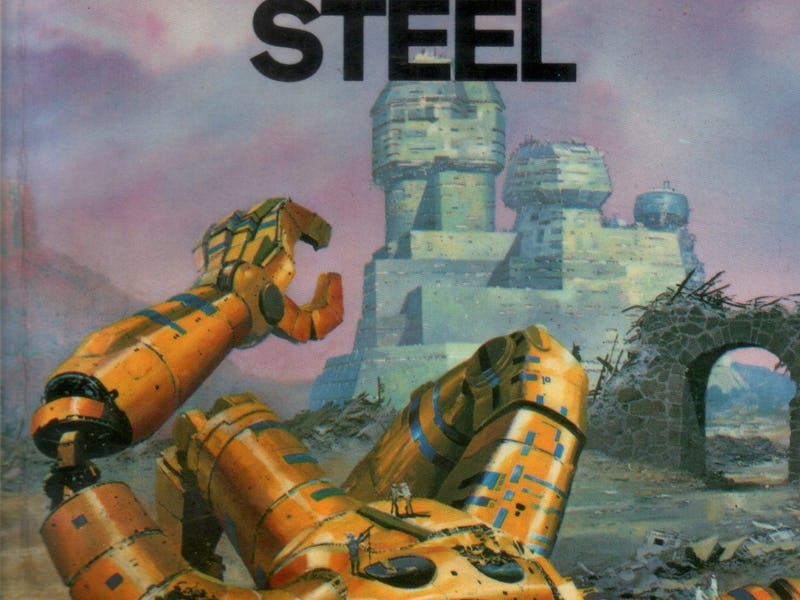Science Fiction Awards Are Basically Bullshit
These awards aren’t helping you figure out what’s really good.

If you thought Westworld was the best sci-fi TV show of last year, you’re not alone. But should it really be competing with Zootopia for the title of best sci-fi project of the year? In the bizarre world of science fiction awards the Nebulas, that’s what’s happening right now. If you think the A.I. Western and the story of a CGI mammal metropolis make for strange bedfellows, it’s only the tip of the space-iceberg, baby.
The problem with prominent sci-fi awards like the Nebulas, as well the Hugos, is that they aren’t providing anything useful to people who aren’t sci-fi insiders. If you aren’t someone who has had their book or short story nominated, chances are you might know they exist, but they don’t carry much weight outside the industry.
Back in 1965, Kurt Vonnegut affectionately called the publishing establishments of science fiction a “lodge,” likening the goings-on to a members-only club. And though the diversity of those clubs has increased, and the books are more progressive, the relationship Vonnegut’s lodge has with the outside world is pretty much the same as it was in ‘65. For most fans, the nominations are meaningless and unhelpful in selecting good reading material. Sci-fi awards are bullshit, basically.
In order for something to make it on the ballot of the Nebulas, it has to be nominated by members or associate members of the Science Fiction and Fantasy Writers of America. This is a little better than the Hugo nominating process, which is loose enough to create loopholes that let all sorts of bigoted groups to hijack the process. But still, the non-insider fan gets bamboozled: SFWA ignores great science fiction writing published outside of the places they usual look. The Nebulas and Hugos will nominate books about fantasy worlds and spaceships, but when the technological sci-fi speculation gets closer to home, those types of books tend to be overlooked. And this doesn’t mean they aren’t finding really obscure, indie sci-fi authors. Just the opposite. Mainstream literary fiction — which is totally sci-fi — gets snubbed by the Nebulas and the Hugos completely.
Back in 1998, in an essay called “The Squandered Promise of Science Fiction,” Jonathan Lethem made a big deal out of Thomas Pynchon’s Gravity’s Rainbow not winning the Nebula Award in 1973 over Arthur C. Clarke’s Rendezvous with Rama. Lethem’s believed this marked “the death of the hope that science fiction was about to merge with the mainstream.” But, though science fiction has now merged with the mainstream, the Nebulas and the Hugos have still failed to take notice.
Which books did the Nebulas miss by favoring to nominate fiction which are put out by “traditional” science fiction publishers? The 2010 awards snubbed Gary Shteyngart’s Super Sad True Love Story, a near-future novel about social media, immortality, that was easily the best science fiction book of 2010. I praised it in a review posted on Tor.com (a sci-fi publishing blog), and I wasn’t alone. Charlie Jane Anders, who is up for a Nebula this year, wrote on io9 in 2010 that Super Sad True Love Story “ … felt like I was reading one of the great dystopian novels of all time.”
Ben Marcus’s The Flame Alphabet — a novel about a futuristic language virus — was overlooked in 2011. In 2012, The Age of Miracles by Karen Thompson Walker, a novel about the orbit of the Earth slowing down, didn’t show up on Hugo or Nebula ballots, either. For 2014, Karen Russells’s Sleep Donation, a sci-fi novella about crews of people donating their dreams, didn’t make the cut. That same year, Alena Graedon’s The Word Exchange, a kind of techno-thriller about telepathic future iPhones was overlooked. And in 2015, the Nebula and Hugo awards forgot about Alexandra Kleeman’s You Too Can Have a Body Like Mine, a novel in which a character is trying to replicate herself with futuristic prosthetics.
All of these books are easy to find. They aren’t underground. But they do have one thing in common: They weren’t marketed as “sci-fi” novels by “sci-fi” publishers. They were all put out by big publishers, received positive reviews, and have science fiction or fantasy elements that are central to their narratives. They are science fiction even if the publisher didn’t want to say it. So, in a close-minded move, the science fiction publishing establishment just ignores these books instead of celebrating them. The dentition of science fiction can and should include near-future sci-fi like Super Sad True Lover Story.
But, it’s not just mainstream books. Popular sci-fi, get shafted, too. Though Andy Weir picked up a Best New Writer Award from Hugo, his book The Martian wasn’t nominated for a Nebula. Now, even if you think the narrator of The Martian is annoying, the book itself is hard science fiction survival story set on Mars. The book that won in 2014 for Best Novel that year was Ann Leckie’s Ancillary Justice, which is an excellent book about living starships and people who were once a part of them. No question that her win was deserved. But for Weir to not even be nominated? It feels egregious enough to seem like a slight.
This year, the while there are a few great authors recognized (like Victor LaValle and N.K. Jemisin), the Nebula Nominations have proven that their nominating committee is still only seeing half the picture. With two huge science fiction novels nowhere on the list — Death’s End and Babylon’s Ashes — it feels like a good time for fans to start looking elsewhere for science fiction book recommendations.